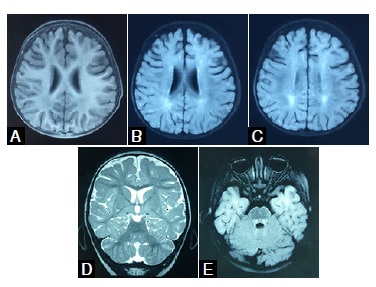Síndrome epiléptico ligado al cromosoma X por mutación de la protocaderina 19 (OMIM 300088) asociado con leucoencefalopatía y tractopatía posterior reversible
Resumen
La epilepsia con retardo mental ligado al cromosoma X por mutación del gen PCDH19, es una condición que solo se presenta en las mujeres. El cuadro clínico suele verse complicado con retardo global del desarrollo y epilepsia. En la edad adulta puede manifestarse con discapacidad intelectual y hasta 20 % de las mujeres afectadas no presentan convulsiones ni retardo intelectual. Se presenta el caso de una niña con epilepsia, retardo del desarrollo y conversión autista, asociados con leucoencefalopatía y tractopatía posterior reversible por mutación del PCDH19 (c.142G>T/ p.Glu48X).
Descargas
Referencias bibliográficas
Hirabayashi T, Yagi T. Protocadherins in neurological diseases. Adv Neurobiol. 2014;8:293-314.
Angst BD, Marcozzi C MA. The cadherin superfamily: Diversity in form and function. J Cell Sci. 2001;114:629-41.
Biswas S, Emond MR, Jontes JD. Protocadherin-19 and N-cadherin interact to control cell movements during anterior neurulation. J Cell Biol. 2010;191:1029-41. https://doi.org/10.1083/jcb.201007008
Dibbens LM, Tarpey PS, Hynes K, Bayly MA, Scheffer IE, Smith R, et al. X-linked protocadherin 19 mutations cause female-limited epilepsy and cognitive impairment. Nat Genet. 2008;40:776-81. https://doi.org/10.1038/ng.149
Liu Q, Sunil Bhattarai, Wang N, Sochacka-Marlowe A. Differential expression of protocadherin-19, protocadherin-17 and cadherin-6 in adult zebrafish brain. J Comp Neurol. 2016;8:583-92. https://doi.org/10.1002/cne. 23746
Emond MR, Biswas S, Jontes JD. Protocadherin-19 is essential for early steps in brain morphogenesis. Dev Biol. 2009;334:72-83. https://doi.org/10.1016/j.ydbio.2009.07.008
Cooper SR, Jontes JD, Sotomayor M. Structural determinants of adhesion by protocadherin-19 and implications for its role in epilepsy. Elife. 2016;5:1-22. https://doi.org/10.7554/eLife.18529
Depienne C, LeGuern E. PCDH19-related infantile epileptic encephalopathy: An unusual X-linked inheritance disorder. Hum Mutat. 2012;33:627-34. https://doi.org/10.1002/humu.22029
Fejerman N. Etiologías genéticas asociadas con epilepsias graves del lactante. Arch Argent Pediatr. 2012;110:421-9. https://doi.org/10.1590/S0325-00752012000500010
van Harssel JJ, Weckhuysen S, van Kempen MJ, Hardies K, Verbeek NE, De Kovel CG, et al. Clinical and genetic aspects of PCDH19-related epilepsy syndromes and the possible role of PCDH19 mutations in males with autism spectrum disorders. Neurogenetics. 2013;14:23-34. https://doi.org/10.1007/s10048-013-0353-1
Kwong AK, Fung CW, Chan SY, Wong VC. Identification of SCN1A and PCDH19 mutations in Chinese children with Dravet syndrome. PLoS One. 2012;7:e41802. https://doi.org/10.1371/journal.pone.0041802
Baulac S, Gourfinkel-An I, Nabbout R, Huberfeld G, Serratosa J, Leguern E, et al. Fever, genes, and epilepsy. Lancet Neurol. 2004;3:421-39. https://doi.org/10.1016/S1474-4422(04)00808-7
Specchio N, Fusco L, Vigevano F. Acute-onset epilepsy triggered by fever mimicking FIRES (febrile infectionrelated epilepsy syndrome): The role of protocadherin 19 (PCDH19) gene mutation. Epilepsia. 2011;52:172-5. https://doi.org/10.1111/j.1528-1167.2011.03193.x
Sharma S, Prasad AN. Genetic testing of epileptic encephalopathies of infancy: An approach. Can J Neurol Sci. 2013;40:10-6. https://doi.org/10.1017/S0317167100012889
Liu A, Xu X, Yang X, Jiang Y, Yang Z, Liu X, et al. The clinical spectrum of female epilepsy patients with PCDH19 mutations in a Chinese population. Clin Genet. 2017;91:54-62. https://doi.org/10.1111/cge.12846
Marini C, Mei D, Parmeggiani L, Norci V, Calado E, Ferrari A, et al. Protocadherin 19 mutations in girls with infantile-onset epilepsy. Neurology. 2010;75:646-53. https://doi.org/10.1212/WNL.0b013e3181ed9e67
Marini C, Darra F, Specchio N, Mei D, Terracciano A, Parmeggiani L, et al. Focal seizures with affective symptoms are a major feature of PCDH19 gene-related
epilepsy. Epilepsia. 2012;53:2111-9. https://doi.org/10.1111/j.1528-1167.2012.03649.x
Antelmi E, Mastrangelo M, Bisulli F, Spaccini L, Stipa C, Mostacci B, et al. Semiological study of ictal affective behaviour in epilepsy and mental retardation limited to females (EFMR). Epileptic Disord. 2012;14:204-309. https://doi.org/10.1684/epd.2012.0526
Higurashi N, Nakamura M, Sugai M, Ohfu M, Sakauchi M, Sugawara Y, et al. PCDH19-related female-limited epilepsy: Further details regarding early clinical features and therapeutic efficacy. Epilepsy Res. 2013;106:191-9. https://doi.org/10.1016/j.eplepsyres.2013.04.005
Gagliardi M, Annesi G, Sesta M, Tarantino P, Conti P, Labate A, et al. PCDH19 mutations in female patients from Southern Italy. Seizure. 2015;24:118-20. https://doi.org/10.1016/j.seizure.2014.08.010
Algunos artículos similares:
- Yolanda Cifuentes, Isabel De la Hoz, Martha Bermúdez, Clara Arteaga, Acidemia orgánica (propiónica) en un neonato detectada por espectrometría de masas en tándem , Biomédica: Vol. 28 Núm. 1 (2008)
- Sara Emilia Giraldo, Javier Rincón, Pilar Puebla, Mariel Marder, Cristina Wasowski, Nadezdha Vergel, Mario Francisco Guerrero, Isovaleramida, principio anticonvulsivo aislado de Valeriana pavonii , Biomédica: Vol. 30 Núm. 2 (2010)
- Diego Alberto Herrera, Sergio Alberto Vargas, Claudia Montoya, Hallazgo por neuroimaginología de microangiopatía cerebral retiniana con calcificaciones y quistes , Biomédica: Vol. 34 Núm. 2 (2014)
- Nancy Gélvez, Johana Acosta, Greizy López, Derly Castro, Juan Carlos Prieto, Martha Bermúdez, Marta L. Tamayo, Caracterización fenotípica y molecular de una familia colombiana con fenilcetonuria , Biomédica: Vol. 36 Núm. 3 (2016)
- Luz Yaqueline Ladino, Johanna Galvis, Diana Yasnó, Adriana Ramírez, Orietta Ivonne Beltrán, Variante patogénica homocigótica del gen BBS10 en un paciente con síndrome de Bardet-Biedl , Biomédica: Vol. 38 Núm. 3 (2018)
- Yully Andrea Rangel, Eugenia Espinosa, Nueva mutación en el gen KMT2B como causa de distonía generalizada de inicio temprano: reporte de caso , Biomédica: Vol. 42 Núm. 3 (2022)

| Estadísticas de artículo | |
|---|---|
| Vistas de resúmenes | |
| Vistas de PDF | |
| Descargas de PDF | |
| Vistas de HTML | |
| Otras vistas | |

























